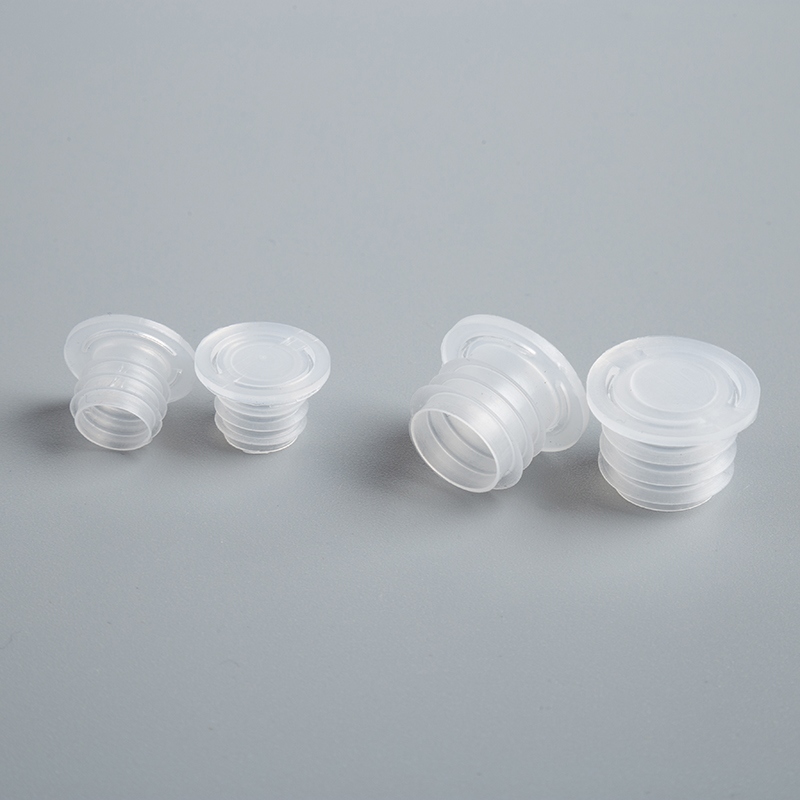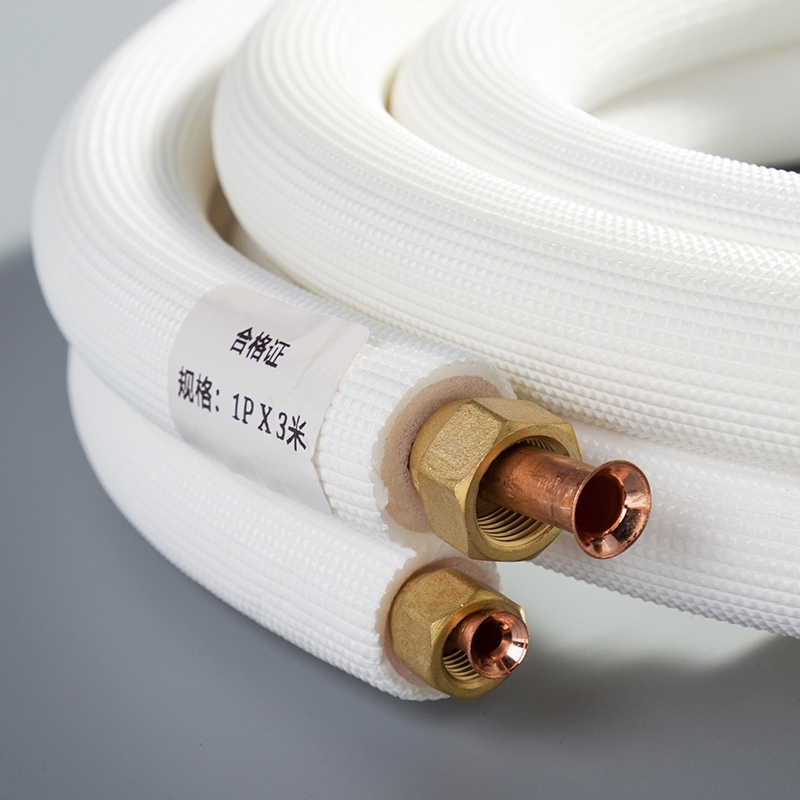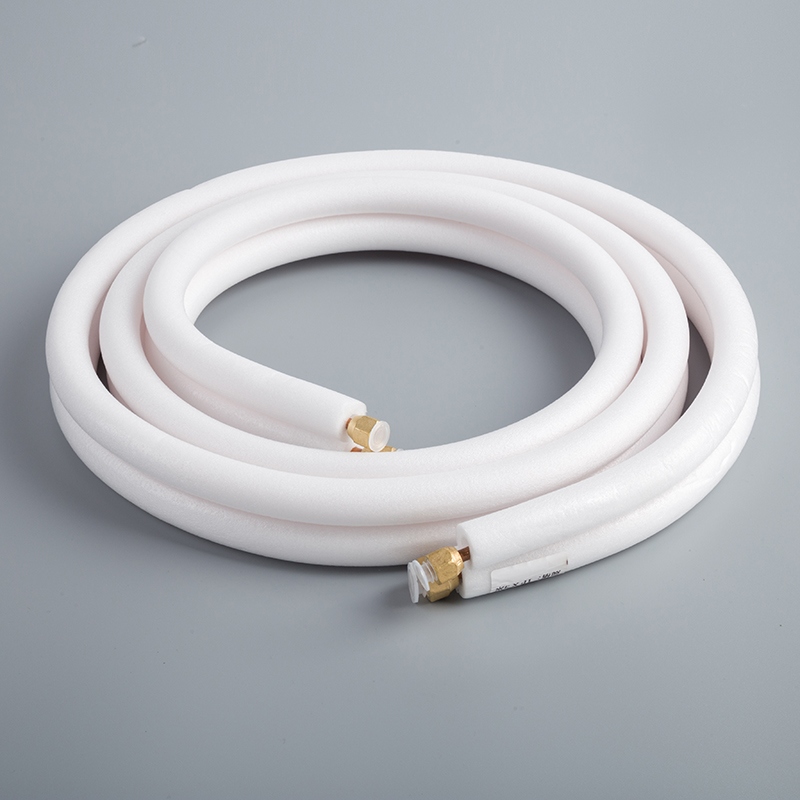Top Air Conditioner Copper Pipe Insulation Products for 2024

Recommendation: Write a blog post on the top recommended air conditioner copper pipe insulation products. Proper insulation for air conditioner copper pipes is essential for optimal performance. High-quality insulation products offer a range of benefits, from enhancing energy efficiency to preventing condensation issues. As we delve into 2024, the latest trends in insulation technology bring forth innovative solutions that promise even greater effectiveness and longevity for HVAC systems.
Why Insulation is Crucial for Air Conditioner Copper Pipes

Energy Efficiency
Reducing Energy Loss
Proper insulation significantly decreases energy loss, ensuring that the air conditioner operates efficiently without unnecessary wastage.
Lowering Utility Bills
Insulating copper pipes effectively lowers utility bills by optimizing the cooling process, leading to cost savings and improved financial management.
Preventing Condensation
Avoiding Water Damage
By insulating copper pipes, water damage risks are mitigated, preventing potential leaks or structural harm within the system.
Maintaining System Efficiency
Insulation plays a vital role in maintaining system efficiency by regulating temperature variations and ensuring consistent performance levels.
Extending Equipment Lifespan
Protecting Against Corrosion
Insulation acts as a protective barrier against corrosion, extending the lifespan of the air conditioning equipment and reducing maintenance costs.
Minimizing Wear and Tear
Effective insulation minimizes wear and tear on components, enhancing overall durability and operational longevity.
Key Features to Look for in Insulation Products
Thermal Conductivity
Importance of Low Thermal Conductivity
Opting for insulation materials with low thermal conductivity is crucial for enhancing energy efficiency and reducing heat transfer through the copper pipes.
Lower thermal conductivity ensures minimal heat loss during the cooling process, leading to improved overall system performance.
Materials like Aerated Concrete offer a balance between compressive strength and thermal insulation, making them suitable for cavity wall construction alongside other insulating materials.
Comparing Different Materials
Insulation Materials are selected based on their consistent resistance to heat transfer throughout the building's lifespan.
Fiberglass insulation, known for its thermal resistance properties, is commonly used in ductwork due to its ease of installation and adaptability to various shapes.
When choosing between materials, it is essential to consider factors such as protection against moisture, especially in high-risk environments where moisture can degrade insulation performance.
Moisture Resistance
Benefits of Moisture-Resistant Insulation
Opting for moisture-resistant insulation products helps safeguard the copper pipes from potential damage caused by water infiltration or condensation.
These products maintain their effectiveness even in moist conditions, ensuring long-lasting protection and optimal performance of the HVAC system.
Ensuring that vulnerable insulation areas are shielded from moisture intrusion is vital for preserving the integrity and functionality of the entire system.
Common Moisture-Resistant Materials
Various materials like fiberglass and plastic foam provide reliable moisture resistance properties, making them suitable choices for insulating HVAC systems exposed to varying environmental conditions.
Properly installed moisture-resistant insulation not only prevents water-related issues but also contributes to maintaining energy efficiency and prolonging the lifespan of the air conditioning equipment.
Durability and Longevity
Factors Affecting Durability
The durability of insulation products depends on factors such as material quality, installation technique, and environmental exposure.
Choosing high-quality materials that can withstand external elements and mechanical stress is essential for ensuring long-term durability and optimal performance.
Regular maintenance checks and timely replacements play a significant role in preserving the longevity of the insulation system.
Long-Lasting Insulation Options
Insulation options like Fiberglass Insulation offer durability against moisture penetration and corrosion under insulation (CUI), making them ideal for protecting HVAC pipes in diverse settings.
Closed-cell foam insulation with a high R-value provides long-lasting protection against temperature fluctuations and vapor ingress, ensuring consistent performance over time.
Selecting durable insulation solutions tailored to specific environmental demands enhances system reliability while minimizing maintenance costs in the long run.
Top Air Conditioner Copper Pipe Insulation Products for 2024

Armacell's ArmaFlex® Shield
Key Features
ArmaFlex Shield: A new flexible foam insulation product designed for line set and HVAC/R applications.
Moisture-Resistant: Features a durable protective coating that resists tears and punctures, protecting against thermal losses and moisture ingress.
UV-Resistant: Withstands the effects of weather, making it ideal for outdoor applications.
Pros and Cons
Pros:
Offers excellent protection against condensation and thermal losses.
Durable coating ensures longevity in various environmental conditions.
Ideal for rough installations due to tear and puncture resistance.
Cons:
May have a higher initial cost compared to other insulation options.
Requires proper installation techniques for optimal performance.
Ideal Use Cases
Residential air conditioning systems where durability is essential.
Outdoor HVAC installations exposed to UV rays and harsh weather conditions.
Commercial buildings requiring long-lasting insulation solutions.
Polyethylene Foam Insulation
Key Features
Polyethylene Foam: Known for its ease of installation and cost-effectiveness in insulating AC lines.
Versatile Application: Suitable for various pipe sizes and shapes, providing flexibility during installation.
Efficient Insulation: Offers effective thermal protection while being lightweight.
Pros and Cons
Pros:
Easy to install, reducing labor costs during insulation projects.
Cost-effective solution without compromising on insulation quality.
Versatile application across different HVAC system configurations.
Cons:
May require additional protective measures in high-moisture environments.
Limited resistance to extreme temperature fluctuations.
Ideal Use Cases
Residential air conditioning systems with standard operating conditions.
Budget-friendly insulation projects without sacrificing quality.
Temporary installations or renovations where flexibility is key.
ThermaSmart ENEV Tube Insulation
Key Features
Closed-cell Polyethylene Foam: High-quality material recommended for heating and plumbing applications in air conditioning systems.
Thermal Efficiency: Provides superior thermal conductivity properties, enhancing energy efficiency in HVAC setups.
Durable Construction: Resistant to wear and tear, ensuring long-term performance in demanding environments.
Pros and Cons
Pros:
Excellent thermal insulation properties, reducing energy loss effectively.
Durable construction minimizes maintenance requirements over time.
Suitable for both residential and commercial HVAC applications with varying demands.
Cons:
Initial investment might be higher compared to traditional insulation materials like fiberglass or foam board options.
Ideal Use Cases
Commercial buildings with high energy consumption that require efficient insulation solutions.
2.Residential properties seeking long-term performance benefits from their HVAC systems.
Fiberglass Insulation
Key Features
Fiberglass Insulation is a popular choice for HVAC pipes due to its resistance to moisture penetration and ability to prevent Corrosion Under Insulation (CUI).
The material's durability and thermal resistance properties make it suitable for various environmental conditions.
Fiberglass insulation effectively maintains temperature control within the air conditioning system, ensuring optimal performance.
Pros and Cons
Pros:
Offers excellent protection against moisture-related issues, preserving the integrity of HVAC systems.
Resistant to corrosion under insulation, enhancing the longevity of copper pipes.
Maintains consistent thermal performance, contributing to energy efficiency.
Cons:
Initial installation may require professional expertise for proper application.
Regular inspection is necessary to detect any signs of wear or damage over time.
Ideal Use Cases
Residential buildings with central air conditioning systems that require long-term insulation solutions.
Commercial facilities where HVAC pipes are exposed to varying temperatures and humidity levels.
Industrial settings with high-performance HVAC requirements seeking reliable insulation options.
How to Choose the Right Insulation for Your Needs
Assessing Your Specific Requirements
Climate Considerations
Evaluate the climate where the air conditioning system operates to determine the insulation's thermal performance needs.
Consider factors like temperature ranges and humidity levels that impact insulation effectiveness.
Choose insulation materials that can withstand extreme weather conditions prevalent in your region.
System Specifications
Analyze the specifications of your air conditioning system, including pipe sizes and layout configurations.
Ensure compatibility between the insulation product and the system requirements for a seamless installation process.
Select insulation solutions that align with the specific demands of your HVAC setup to optimize performance.
Consulting with Experts
Importance of Professional Advice
Seek guidance from industry experts or HVAC professionals to receive tailored recommendations for your insulation needs.
Benefit from their expertise in selecting the right materials based on your system's unique characteristics.
Professional advice ensures optimal insulation performance and long-term efficiency for your air conditioner copper pipes.
Where to Find Reliable Experts
Explore reputable HVAC companies or insulation specialists known for their quality services and expert consultations.
Attend industry seminars or workshops to connect with knowledgeable professionals in the field of HVAC insulation.
Online forums and platforms dedicated to HVAC discussions can also provide valuable insights from experienced experts.
Insulation Professional emphasizes the significance of selecting the right insulation for air conditioner copper pipes. Consider factors like climate, budget, and existing structure when choosing from options such as fiberglass batts, spray foam, cellulose, or rigid foam boards. Consulting with an expert ensures optimal performance tailored to your home's specific needs. Make informed decisions by seeking professional advice on the best insulation type for efficient HVAC systems.
See Also
The Impact of Pure Copper Pipes on Air Conditioning
Enhance Air Conditioner Efficiency with Copper Pipe Insulation Tips
Benefits of Selecting Copper Pipes for Air Conditioning
Exploring Optimal Insulation Solutions for Copper Pipes
Key Advantages of Copper Pipes in Air Conditioning Innovation


